- Home
- Alan Campbell
Scar Night; Book One of the Deepgate Codex Trilogy Page 10
Scar Night; Book One of the Deepgate Codex Trilogy Read online
Page 10
Dill was trembling so much, his nod became an extension of his shaking.
“Don’t be so afraid, lad. Help me, cover for my weakness, and I will endeavour to have any future punishments administered in this manner too. Not that I expect to see you before me again like this. You are an adult now. Do we have an agreement?”
“Yes, Your Grace.”
“Good.” Presbyter Sypes smiled. “Mustn’t let any of them think I’m a doddering old fool.”
“No, Your Grace.”
“Well, now, my nap has been disturbed, and I am currently enduring one of those rare moments of lucidity, so we may as well make the best of it. I’d say we have thirty lashes’ worth of time together, and they expect me to administer them at leisure. This is a schoolroom, so why not read something. Where are you in the curriculum?”
“Your Grace, you threw the curriculum away, during our last lesson.”
“I did?”
“Through the window.” Dill pointed out a fresh pane of glass, still smudged with the glazier’s fingerprints.
“Oh my. What book was it?”
“I don’t know. A heavy one.”
“Good for me, I loathe the dense stuff. Did we then study something else?”
“You said that, as I’d turned sixteen, it was time to learn the most important lessons of life.”
“Did I?” The Presbyter frowned. “Yes, yes, of course. I remember,” he said unconvincingly.
“Well, I was wondering…”
“Yes?”
“A topic we broached last time…?”
“Ah.” Presbyter Sypes stiffened. “Oh, my memory.” He rattled his fingers against his teeth. “Well, let’s not be bashful. If I’ve started on this subject, I ought to finish it…I suppose it was only a matter of time. Sixteen years, so of course…” He opened the journal again and scanned a page, but Dill suspected he wasn’t really reading it. The Presbyter had now turned an odd shade of pink. His lips thinned. He made a clucking sound. Finally, he fixed his eyes on Dill. “Women,” he said.
“No, Your Grace, it’s not that.”
“No?”
“We were talking about the war.”
“The war?” Presbyter Sypes let out a long sigh. “Ulcis’s grace, yes, the war. I’ll tell you about the war.”
For a moment he appeared to gather his thoughts, gazing past Dill. “Mostly the Heshette,” he muttered. “The others were too busy garrotting each other over goats or stealing each other’s wives. But the Heshette…” He kept nodding. “Three thousand years ago, Callis came to raise the temple over Ulcis’s realm, but the Heshette vowed to tear it down. The first battle, the Battle of the Tooth, came when Deepgate was still a community of tents and mud huts raised around the abyss. With no city walls to keep the heathens out, one hundred archons and barely two thousand pilgrims managed to defeat a horde twenty-five times their size.”
The Presbyter smiled. “But you already know this part of the tale?”
“Yes, Your Grace.” Dill knew the story of that battle well. Many accounts had been written by scholars or past presbyters, and Presbyter Sypes himself had told him more than one.
“Then I’ll skip it.”
“No, Your Grace, please.”
The old priest’s smile broadened. “Scrimlock’s account began with two questions.”
Dill remembered: this was his favourite anecdote of the battle.
How many?” Callis had asked. “And where?”
Balthus Brine hunched on his knees on the carpet of the Herald’s sun-baked tent, his broad shoulders casting a wide shadow across the map spread before him. “Herald, our best estimates put them at forty to fifty thousand. Eight thousand pure Heshette, with their trade cousins from Dalamoor at twice that number, and a score of Heshban tribes gathered from the northern Deadsands. Then there are camel herders from the steppes, branded nomads caught up in the war, and a small unit of salt mercenaries brought in from the Lowlands, some fifteen hundred men. There haven’t been this many heathens in one place since the Poleman York boasted there was still a virgin in Sanpah. At present, the army is camped four leagues southwest of Blackthrone, here .” He pointed to a spot on the map. “Ten to twelve days away.”
“Salt mercenaries?” the angel asked.
“Herald, the Heshette have paid them with salt from the Pocked Delta.”
Callis boomed a laugh. “Then let’s hope they bring their wages with them to battle. We’re out of salt, are we not?”
“We’re out of a lot of things, luck being one of them.” Balthus squeezed the nape of his neck. “Herald, the army marches quickly. All but these mercenaries are desert men. If we are to have any chance of reaching the Coyle and the shelter of the river towns, we must leave now.”
“Flee, Balthus?” Callis’s eyes glittered. “I will not flee.”
“Herald, we cannot defend Deepgate against such a force. We could construct defensive walls, but…” He left the rest unsaid. Would such fortifications delay their inevitable end by as much as an hour?
“Agreed. It would not be to our advantage to remain in the settlement.”
“Then we retreat to the temple? We might defend the chains, but we don’t have the supplies to outlast a siege. The water pipe to Jakka is incomplete, and less than half our caravans will return before the horde is upon us. We would perish of thirst in a month.”
“That’s true,” Callis said casually.
Balthus waited, but the angel said no more. At last he asked, “Herald, what are your orders?”
“We march against them.”
Balthus almost choked. “Against fifty thousand men?”
“You said yourself, it might be only forty.”
“Still…” But he found Callis’s gaze too difficult to meet. The intensity of those dark grey eyes unnerved Balthus, so he stared down at the map as though a solution to their dilemma might somehow appear there. “We have swords for seventy men,” he said. “Four barrels of blackcake brought from…overseas. And the Ninety-Nine, of course.” He drew a circle around the talisman at his chest and touched his brow. “If, by the will of Ulcis, they will answer your summons.”
“Do you doubt me, Balthus?”
“No, Herald, but one hundred archons, barely two thousand pilgrims…?”
“And a Tooth,” Callis said.
Balthus stared at the Herald for a slow moment, then a grin spread across his face. All this time the solution was—and the pun widened his grin further—right in their faces.
“Herald, I will begin preparations at once.” He left the angel still pondering the map and stepped outside, into the shadow of the Tooth.
The Tooth was a wonder: it towered over the settlement like a citadel carved from bone. Callis had brought the machine into Markeh forty years ago, and it had shaken the earth in more ways than one. The Herald had preached from the Tooth’s high walls: how Ayen, goddess of light and life, furious at the wickedness of men, had sealed Heaven. How she had abandoned earthbound souls to the Maze.
At this there was much consternation among the men in Markeh, for they had no desire to wander Iril’s bloody corridors among the souls of the wicked.
Callis had calmed the crowd. Seven of Ayen’s sons had stood against her; they had raised an army of angels with which to displace the goddess. Their coup had almost succeeded, but at the final hour Ayen’s own forces had proved too strong. The goddess had prevailed and expelled her sons from Heaven for their treachery, casting them down with the last of their defeated armies to join mortal man in his realm below.
Balthus had listened in awe and fear, with the others, and had known it to be true. Last winter had they not seen the night sky blaze with Ayen’s fury? Had they not witnessed seven stars fall?
All was not lost, Callis had then explained. Hope for man now rested with Ayen’s eldest son, Ulcis. The god of chains had fallen to these lands, had been driven deep within the earth. Weakened but not destroyed, the god had sent his Herald forth to build a
temple: to proclaim that Ulcis offered salvation in his abyss. Souls sent down to him would be spared Iril after death. The god of chains was building a new army with which to storm Heaven.
Balthus had been so shaken by this revelation, he’d shed his old life, as easily as a cloak, to join the pilgrims constructing the temple.
Now, outside the Herald’s tent, he lifted his gaze past the Tooth’s river-wide tracks, up its pale hull to the scorched funnels rearing hundreds of feet above, where smoke from its lungs poured into the desert sky. This thing was a fortress, Balthus realized, and more than that: it was a weapon. For the last four decades, the relic’s massive cutters had bitten deeply into the slopes of Blackthrone, gouged that strange ore from the flesh of the mountain, and brought it to Deepgate to forge the temple’s chains.
Fifty thousand men?
They might as well be fifty.
Yet Balthus had failed to consider what this machine could mean to them in battle. The Tooth had become as much a part of the landscape as the abyss itself. How often does one really notice the ground beneath one’s feet or the roof above one’s head? Had he changed so much that he could take such a manifestation of the god’s power for granted? Balthus walked over to the edge of the abyss and knelt in the sand to beg forgiveness from his lord down below.
All work had halted since news of the advancing horde had reached them. The walkways zigzagging from the perimeter in to the hub were deserted. A deep silence hung over the abyss itself. All ninety-nine foundation chains were now in place and the main skeleton of the temple was beginning to take shape. Balthus let his gaze roam over the vast scope of the construction: Mesa’s chain, Perpaul’s, Simon’s; each as mighty as the legend of its namesake. They were Ulcis’s greatest warriors, survivors from the war in Heaven. Forty years ago Balthus would not have believed mortal man capable of building such a thing.
Truly, he was grateful.
Preparations for the battle were made in earnest. The pilgrims loaded what supplies they had into the Tooth’s holds. Men, women, and children were housed in temporary quarters within. And Callis summoned the Ninety-Nine.
Ulcis’s angels rose from the abyss to join their commander, their armour wreathed in death-light, their swords glittering under Ayen’s furious sun.
Balthus shivered at the sight of them. “Are they dead?” he asked Callis.
“They have given up eternity for us,” the angel replied. “In this world they cannot survive. Ayen’s light will destroy them, just as it destroys men.” His eyes narrowed. “But while alive they will burn brightly.”
At the Herald’s command, a bottle of black liquid was brought forth.
Balthus gave Callis an inquiring look.
“Angelwine,” Callis replied. “A gift from our lord.”
“A potion?”
Callis laughed. “Of sorts. It will bestow great power, strength, and longevity upon those archons who drink it. A magnanimous god, Ulcis, to share his divinity for a time, don’t you think?”
Balthus eyed the angelwine. Could this elixir really contain the power of a god? The liquid boiled like smoke, and it seemed to him he heard whispers within the glass.
“It is alive,” he gasped.
Callis held up the bottle. “This wine,” he said, “contains the souls of many men.”
“Human souls?”
“Enemies of Ulcis.” His tone warned against further questions.
Balthus watched as each of the Ninety-Nine supped the angelwine. He watched their eyes turn black and the death-light darken around their armour. And when the Herald himself had taken his share, Balthus could no longer contain his desire. “Might a loyal servant be permitted to drink too?” he asked.
Callis seemed in the grip of a murderous fever. He wheeled savagely, face contorted, and for a heartbeat Balthus feared for his own life. But then the violence left the angel’s eyes and he looked upon his servant with pity. “Balthus,” he said, “this elixir is too potent for man. It would drive you insane.”
On the dawn of the day of battle a great sandstorm rose, as if the god of chains was beating his wings beneath the earth. Balthus Brine watched from the Tooth’s bridge, with Callis at his side. Throughout the battle, the Herald did not speak. His rage had faded and he gazed down at the slaughter with an expression on his ageless face that might even have been regret.
“Do you mourn them?” Balthus asked.
“They are savages,” Callis said.
Balthus nodded, and his white teeth split his brown lips.
“Like us,” the Herald said, and he shared his servant’s grin.
The storm raged and the Tooth ploughed through enemy flesh and the archons’ swords blazed until earth was as red as the sand-choked sun. And when at last the winds died and the killing was done, the corpses of twenty thousand men lay strewn across the Deadsands. The remainder of the horde fled from the Tooth, and from the angels, and Callis stood triumphant upon a mountain of the dead.
“All who are still whole will be blessed and cast into the abyss,” he commanded. “They will be redeemed.”
Balthus said, “But they sought to destroy us. They do not deserve a place in our lord’s army.”
The angel smiled. “A magnanimous god, Ulcis.”
Did Callis really live for a thousand years?” Dill asked.
The Presbyter took a moment to focus on him, and then looked away. “Records conflict,” he muttered, “although most would agree with that estimate. Alas, his sons did not inherit their father’s longevity.”
Dill considered this. A thousand years of life from one sip of angelwine. Had there been more of the elixir, would the angel still be alive today? “But the Heshette returned,” he said.
“Returned, yes, but never again in those numbers. The Battle of the Tooth taught them a harsh lesson. It wasn’t until two hundred years ago that the balance began to shift again. Our spies discovered a caste of shamans among the Heshette who were urging the desert peoples toward a second war. We struck out, hoping to halt their momentum, to slay the shamans, but our efforts only strengthened their cause.”
The old priest sniffed, rubbed at his nose, and went on, “They rose again, and for many years our armies held them back with nothing but faith and steel. And with the aid of Callis’s sons, of course. The Herald’s line held strong.”
Dill grimaced inwardly. The scratch on his finger seemed at once to sting. But the Presbyter continued, as though speaking to himself. His eyes had dulled a little, but he spoke with passion.
“Each time the heathens recovered, they returned, though rarely any stronger than before. Scattered tribes, mostly—roused as always by the Heshette core and their snake-tongued witch doctors. They remain loyal to Ayen, and have vowed to destroy her outcast sons.” Sypes seemed to drift within himself for a moment. “Tattooed and bearded savages…cannibals too, it’s said. They eat their own wounded and drink some foul brew fermented from blood and milk.” The Presbyter’s brow furrowed. “But then, they say a lot of such things in this city.”
Dill tried to imagine the Heshette, their sun rituals and the human sacrifices the missionaries sometimes spoke of. In his mind they scrapped like dogs, fork-tongued shamans flitting among them like whispering ghosts. He imagined himself standing before them, on the abyss rim, the last archon standing guard before the panicked streets of Deepgate, his sword high, his eyes dark and deep as Ulcis’s lair.
The Presbyter went on, “Faith and steel, and god’s will, kept us safe for so long, but that summer thirty years ago galvanized the tribes and raised their hopes. A drought, the worst in history, withered most of our crops. Dust storms ruined the rest. The Coyle, never known to fail before, dried to a trickle. Everyone suffered equally; those of us in Deepgate as much as the desert folk. But the tribes saw omens in that drought. They believed the goddess Ayen was punishing them for our actions. For the first time since the Battle of the Tooth, they stopped warring among themselves and united. Once more they marched against us
as one army, the shamans among them, urging them on. Our troops were stretched too thin in the desert, so we retreated and fought them on the perimeter of the chasm.
“Even then we were outnumbered. Our soldiers had training, discipline, keener swords, but they struggled against the sheer weight of numbers. Gaine himself slew more than forty of the foe. The tribes always were afraid of your line, and understandably so. You should have seen him.”
Dill saw in his mind the tribes advance: all tattooed and wild-eyed, an army of rags and muscle. He saw his father alone, defiant, before them. Gaine’s sword flashed, cleaved through flesh and bone. Heads flew from shoulders and blood rained. Men sank before him. Gaine took to the air and the heathens fled screaming back into the Deadsands.
And Devon saved us,” Rachel Hael said. She had entered without knocking and, judging by Sypes’s expression, it was a habit he felt she should shake off.
Dill spun round. “What do you want?” he snapped, then glanced back at the Presbyter. Dill’s eyes reddened.
Rachel’s relief at finding the angel had been spared the whip was diminishing quickly.
The Presbyter eyed her warily. “Adept Hael here is quite correct. Back then, Devon was apprentice to the Arch Chemist Elizabeth Lade, his future wife, in the Poison Kitchens.”
“Devon is married?” Dill looked surprised.
“Was,” Sypes said, turning back to him. “The poor woman. Few survive to old age in that particular field of work—the fumes in there.”
Rachel bristled at Sypes’s dismissive manner. She bit back a retort.
“Elizabeth was more concerned with the development of narcotics,” Sypes went on. “We were looking for alternative ways to counter the threat posed by the Heshette without resorting to out-and-out genocide. Addiction to soporific chemicals was being considered.” He shrugged. “But the possibilities were never fully explored. After his wife’s death, Devon returned the focus of his research to straightforward poisons and the like, for military application. He had a certain…zeal for such work.”

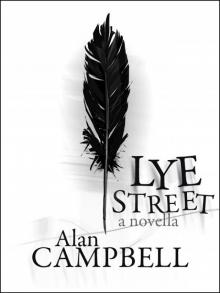 Lye Street
Lye Street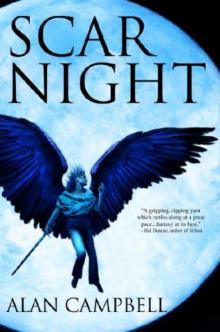 Scar Night; Book One of the Deepgate Codex Trilogy
Scar Night; Book One of the Deepgate Codex Trilogy Art of Hunting
Art of Hunting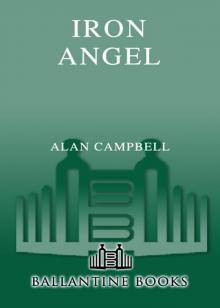 Iron Angel
Iron Angel Gravedigger 01 - Sea Of Ghosts
Gravedigger 01 - Sea Of Ghosts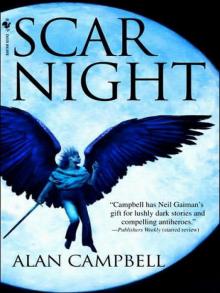 Scar Night
Scar Night The Art of Hunting
The Art of Hunting God of Clocks
God of Clocks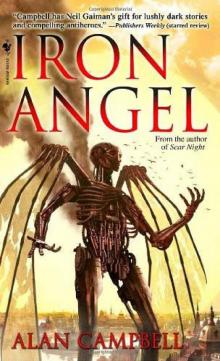 Iron Angel dc-2
Iron Angel dc-2